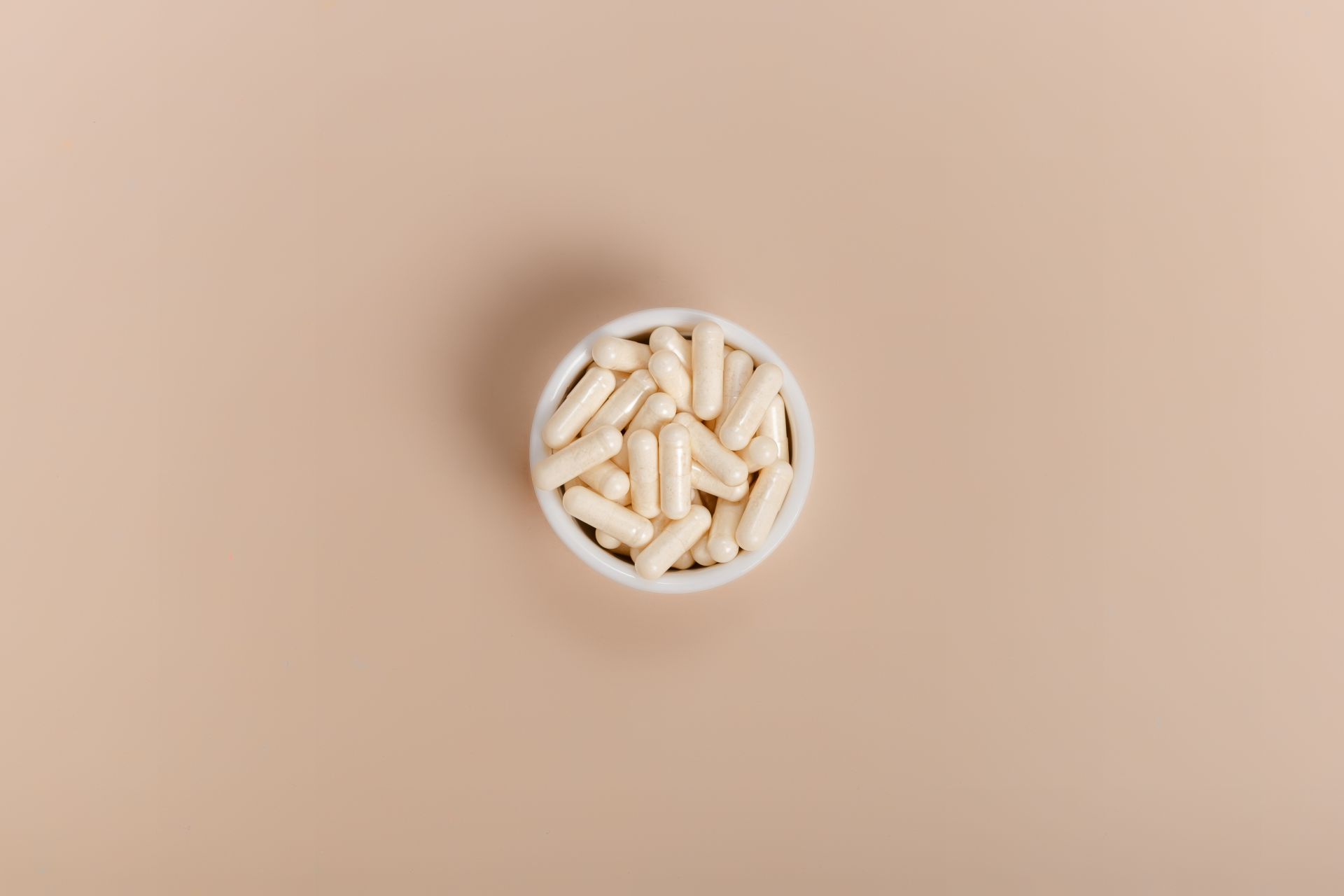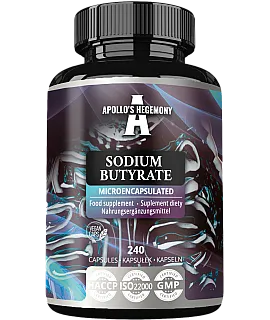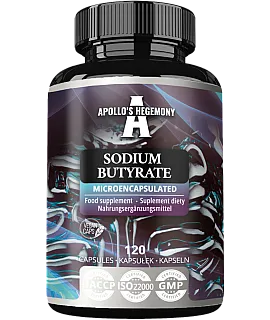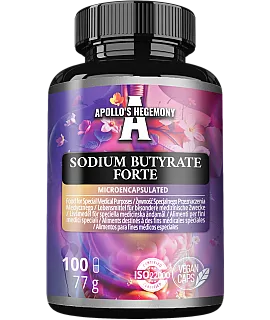Sodium butyrate - what is it and what is its use?

Sodium butyrate is one of the most popular gut supplements. It is known for its effectiveness, safety of action and versatility. It is a source of butyric acid, a fatty acid that regenerates the intestines, supports beneficial bacteria and regulates the digestive tract. However, not everyone knows that not only the intestines can benefit from the presence of sodium butyrate. In this article we will screen sodium butyrate - we will discuss what exactly this substance is and what good it does in the human body. Read to the end!
- What is sodium butyrate?
- Health properties of sodium butyrate
- The use of sodium butyrate in IBD and IBS - effectiveness confirmed by studies
- It's not just the gut that benefits from sodium butyrate
- Sodium butyrate - microencapsulated or not?
- Summary
What is sodium butyrate?
Sodiumbutyrate is the sodium salt of butyric acid. Butyric acid is a short-chain fatty acid (SCFA) that is beneficial for intestinal health and many other aspects of health. It is found in the form of a sodium salt in dietary supplements, because this way it gains better parameters regarding stability, among other things, and the specific odor of butyric acid, which is unpleasant by nature, is reduced.
It is also a histone deacetylase inhibitor, thus modulating gene expression. It prevents DNA transcription or, conversely, can enhance acetylation by stimulating histone acetylase causing chromatin to relax and allowing the promoter of a given gene to attach.
Butyric acid, like other SCFAs (acetate and propionate), is produced in the lumen of the colon by the anaerobic fermentation of dietary fiber by bacteria. It is called a postbiotic, meaning a beneficial metabolite produced by intestinal probiotic bacteria.
Health properties of sodium butyrate
The main property is to support intestinal health. Butyric acid playsan important role in maintaining normal pH levels and protecting the intestinal mucosa from microorganisms. It also regulates intestinal motility and blood flow in the colon. It is used to stimulate the growth and maturation of intestinal epithelial cells, resulting in the gradual recovery of the diseased intestinal mucosa and restoration of the physiological intestinal barrier. It stimulates sodium and water reabsorption and plays a role in maintaining water-electrolyte balance.
The use of sodium butyrate in IBD and IBS - effectiveness confirmed by studies
IBD is an inflammatory bowel disease that is very unpleasant in its course and severely impairs quality of life. Sodium butyrate, although a simple supplement, is often used as an adjunct to conventional treatment, and with good results.
A study on 49 patients with IBD (Crohn's disease or ulcerative colitis) tested the effect of sodium butyrate compared to placebo with 2 months of supplementation. Supplementation here was in addition to treatment. The results noted that sodium butyrate exerted an anti-inflammatory effect by modulating the composition of the intestinal microflora. It increased the proportion of bacteria that produce short-chain fatty acids (SCFAs), including, among others, just butyric acid. The implication is that administering sodium butyrate externally in capsules over time supports our own butyric acid production mechanisms.IBD patients using sodium butyrate reported an improvement in quality of life greater than placebo.
In another study on IBD patients, the addition of microencapsulated sodium butyrate to standard treatment resulted in therapeutic success (as determined by Mayo index and calprotectin levels) in 83.3% of participants compared to 47.6% in the control group.
Irritable bowel syndrome (IBS) is the most common (~11% of the general population) chronic condition, manifested by abdominal pain and bowel movement disorders. In addition to probiotics, sodium butyrate is one of the most commonly chosen supplements in hopes of alleviating IBS.
A Polish clinical trial involved 3,000 people with a confirmed diagnosis of IBS. Participants used palm oil-encapsulated sodium butyrate at a dose of 150 mg twice a day for 12 weeks. The main objective of this study was to evaluate the effectiveness of sodium butyrate in reducing the severity of clinical symptoms and improving the quality of life of IBS patients. A statistically significant improvement in the severity of abdominal pain was observed. In addition, bloating, diarrhea, constipation, urgent stool pushing, nausea and vomiting significantly decreased. The majority of respondents (93.90%) said they would continue therapy, and 88.9% would recommend sodium butyrate to other IBS patients. They concluded that sodium butyrate can effectively alleviate IBS symptoms by modifying the intestinal microflora.

Why does sodium butyrate work so well in IBS?
When IBS is diagnosed, a specific diet is usually recommended, restricting products that contain easily fermentable carbohydrates. This simultaneously gets rid of a large number of products that are precursors to butyric acid production by microorganisms in the intestine (so-called butyrogenic products). There is therefore a trade-off here.
Adding supplementation with ready-made butyrate makes the problems generated by the diet recommended in IBS obsolete. The intestinal epithelium does not depend on the butyric acid produced by the bacteria from the dietary fiber, since we ourselves are cranking out the bacteria and providing ready-made butyrate in a capsule.
There is no evidence that butyric acid deficiency can be directly linked to the pathogenesis of IBS, but it is known that its absence can exacerbate the symptoms of the disease.
It's not just the gut that benefits from sodium butyrate
Sodium butyrate is a supplement that is quite precisely targeted at supporting intestinal health. However, that doesn't mean we can't count on additional health benefits. By the way.
Effects of sodium butyrate on the brain
Butyrate has neuroprotective effects, as indicated (for now) by numerous in vitro studies. These studies show that sodium butyrate inhibits the process of nerve cell death induced by various types of toxins. This has been found for such agents as beta-amyloid and lipopolysaccharides, among others, which have been linked to the pathogenesis of Alzheimer's disease.
Sodium butyrate exerts a neuroprotective effect through anti-inflammatory and antioxidant effects. It can also alleviate blood-brain barrier dysfunction and enhance the function of transporters that promote cellular metabolism in neurons. In the neuroprotective effect, the effect of sodium butyrate on histone acetylation is very important.
Effects of sodium butyrate on metabolism
Let's start with a study on mice, which was warmly received in the scientific community. It tested how the addition of sodium butyrate would affect the health of mice that eat a high-fat diet. It turned out that sodium butyrate was a factor that mitigated the adverse changes that occur in mice on a high-fat diet compared to a low-fat diet. Sodium butyrate attenuated the increase in IL-6, TNFα, triglycerides and pro-inflammatory lipopolysaccharides. It also attenuated changes in the composition of the intestinal microflora.
There is another interesting study on mice in the context of non-alcoholic fatty liver. With sodium butyrate supplementation, liver inflammation and fat accumulation were alleviated, liver triglyceride and cholesterol levels decreased, NAS scores decreased significantly, and metabolic indices such as FBG and HOMA-IR and liver function indices ALT and AST improved. With all this, there was also an improvement in the composition of the intestinal microflora, increasing the proportion of butyric acid-producing bacteria.
Sodium butyrate - microencapsulated or not?
It is not enough that butyrate enters the intestine. For the right effects, it must be used in the right place. In this case, the right place is the large intestine, and ideally the butyrate should be distributed throughout its length. This task is not easy. Therefore, some kind of protection is needed to guarantee that the butyrate reaches the right place.
Such a safeguard is microencapsulation. The use of this technology protects against the complete utilization of butyric acid in the upper gastrointestinal tract. Analyses prove that microencapsulated sodium butyrate reaches the large intestine in a significant amount (35-50%).
Sodium butyrate can be microencapsulated with various materials, including:
- palm oil,
- stearic acid,
- pregelatinized starch.
Summary
Sodium butyrate supplementation is mainly used to support intestinal health, and on occasion some additional benefits can be derived from it for other organs and systems in the body. Sodium but yrate is extremely safe and well tolerated in most cases.
To enjoy good health, it is necessary to ensure that the gut microbiome is able to produce sufficient amounts of butyric acid on an ongoing basis. For this you need both an adequate microflora composition and an ongoing supply of dietary fiber. If these factors are not optimal, supplementation with sodium butyrate can provide significant benefits, while helping to regulate the microflora and improve the efficiency of butyric acid production in the future.
Sources:
 ⮜ Previous article
⮜ Previous article
Does creatine help reduce body fat?
 Next article ⮞
Next article ⮞


